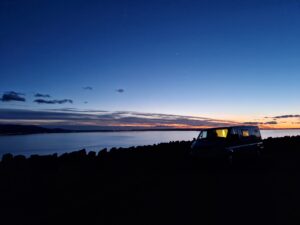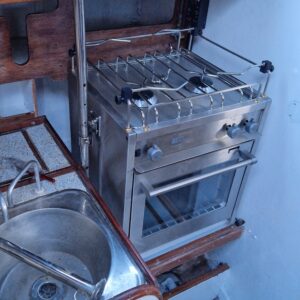
The refit is almost complete. It is time to move back aboard. It is time to move out of the campervan.
Yes, for the past six months, I have been living in a Ford Transit.
This was the logical choice. Obviously, I had to move off Samsara – the cabin being torn apart to get at the chainplates, the central hatch and whatnot.
I did consider renting a room, but how much would that cost? Besides, how boring is renting a room? How depressing!
But a camper van… now that could be fun – and I would have wheels into the bargain.
The more I thought about it, the more of a brilliant idea it seemed: I could do a tour of the children at their northern universities, I could visit friends – including the old school chum in Scotland I hadn’t seen since we were both 19 and hitchhiked to the South of France…
And so, for six months, I lived in a space even smaller than the boat – 2.9m by 1.8m and with headroom of just 1.4m to be exact – but then, didn’t I once spend weeks at a time in an 18footer?
And it was fun.
For one thing, I became a part of that little-known undercurrent of 21st century culture: vanlife.
This is what happens to people who fall out of the bottom of society, hand back the keys to their grotty flat and take to the road where they blossom and flourish (there’s a film about it – look up Nomadland).
I joined the VanlifeUK Facebook group – which turned out to be full of advice on the error codes of Chinese heaters and where to find a water tap. Then there is an app called Park4Night which tells you the nearest place you can stop without getting moved on by the police and provides useful information about the scenery, the local pub and whether you will be troubled in the middle of the night by doggers trying to peer through your curtains.
I chose a Transit over an out-and-out motorhome. Purist vanlifers would not be seen dead in an AutoSleeper deluxe. With a van, parking overnight on a residential street, you might be mistaken for a tradesman. It’s called “stealth camping”. Maybe I should have invested in a bit of signwriting rather than the go-faster stripes it came with.
On the very first night, parked off the road in the middle of nowhere on the way back from the dealer in Derby, there was an enormous crash on the side. Honestly, I thought someone had run into me.
It was only the local farmer going home late on his quad-bike and probably resenting someone being tucked up without a care in the world.
Another time, somewhere in the wilds of Cambridgeshire, a polite tap on the door: I was cooking dinner and looked out to find two uniformed men and a van emblazoned with “Security”. With the utmost courtesy, they explained they were contracted by the local parish council to break up travellers’ encampments.
Commenting only on the delicious smell of frying onions which wafted from my sliding door, they agreed: “We can see you are a mature gentleman. You’re not going to cause any trouble, so we will wish you a pleasant evening and ask you to move on in the morning.”
I assured them I would – just as I assured the churchwarden in Yorkshire that I was only in the car park at ten o’clock in the morning because I had flattened the engine battery trying to charge my laptop. The AA would be along directly.
Reading about it now makes me think that, actually, it was all a bit more interesting than I remember. The original plan had been to write a book about it: Old Man in a Van – I think I may have the first chapter tucked away in the microchips somewhere.
But in fact, life in just over seven cubic metres soon became fairly mundane because I was not constantly on the move, seeing new places, meeting new people. In fact, I stayed for most of the time in the marina, parked right next to Samsara and plugged into her electricity supply at night (she hogged it during the day to run the dehumidifier).
Also, I had to get out before eight in the morning to avoid being blocked in by the boatyard staff with their travel lift, tractor and trailer, JCB and so on – quite apart from the possibility of them plonking a 50footer across my exit. I’m sure they did it deliberately – although maybe living in a space somewhat smaller than a Devil’s Island prison cell might have sparked a bit of paranoia.
One way and another, the more I think about it, the more interesting it seems. Maybe there’s a book in it after all.
Meanwhile, if you fancy sampling vanlife, I can recommend it – and, if you like small boats, there’s the ideal vehicle on eBay just at the moment: https://www.ebay.co.uk/itm/165974806158?mkcid=16&mkevt=1&mkrid=711-127632-2357-0&ssspo=DRYBxYtWSam&sssrc=2524149&ssuid=DRYBxYtWSam&var=&widget_ver=artemis&media=COPY


When I was building the toilet for my boat (yes, I had to build it because the so-called composting heads offered comercially are too big and too expensive), I visited several of these van web sites and Youtube channels to do my research as most of them have a desiccating head in one form or another. Its amazing how self sufficient these people try to be, hats off to them, living a lifestyle not too different from us cruisers. I hope you didn’t mention that cruising on a sailboat you could a lot farther and a lot more fun. The anchorages are already over populated 🙂
I had a lovely lady, a Spanish physiatrist, who worked with me on rebuilding my boat. Her dream was to own a van, and so she did, she owned two of them. Now I understand there is a van culture. Good luck with the rest of your boat projects, they never seem to end.